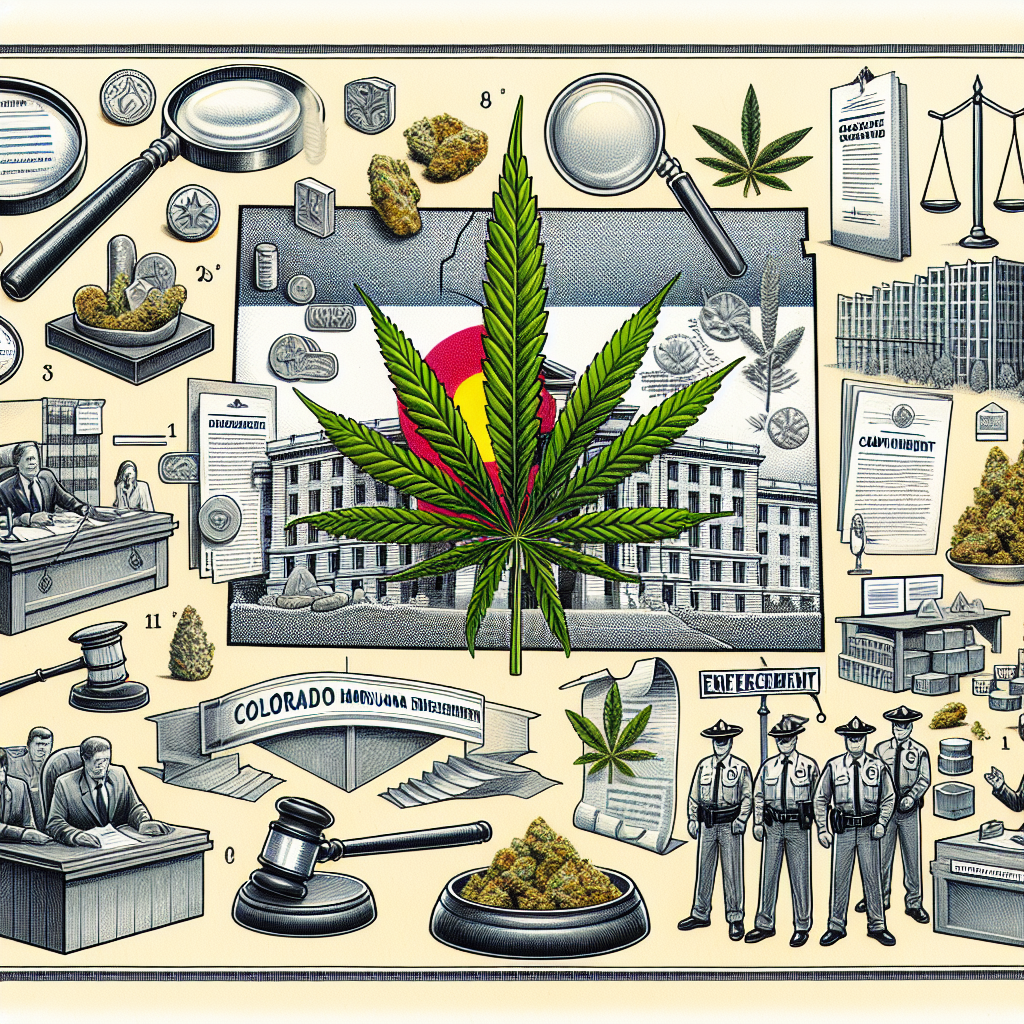Contents
Introduction to Delta-9 THC
Delta-9 Tetrahydrocannabinol (THC) is a primary cannabinoid found in the cannabis plant, renowned for its psychoactive effects and therapeutic potential. As interest in cannabis use continues to grow, Delta-9 THC has garnered increased attention for its role in both recreational and medicinal applications.
Alongside Delta-9 THC, another cannabinoid, Delta-8 THC, has emerged in the spotlight, prompting discussions about its legal status and distinction from Delta-9 THC. While Delta-8 THC shares some similarities with its counterpart, it possesses distinct psychoactive properties and regulatory considerations, shaping the legal landscape surrounding cannabis products.
In this comprehensive overview, we delve into the legal framework surrounding Delta-9 THC in Colorado, examining current laws and regulations governing cannabis and cannabinoids in the state. By exploring recent legislative developments, enforcement measures, consumer access, industry perspectives, public perception, and potential future changes, we aim to provide a thorough understanding of the legal landscape surrounding Delta-9 THC in Colorado.
Furthermore, we offer guidance for consumers navigating the legal complexities of Delta-9 THC, providing insights into compliance with state laws and regulations to ensure safe and responsible use. Through this exploration, we aim to shed light on the current status and future outlook for Delta-9 THC regulation in Colorado, offering a comprehensive perspective for stakeholders across the cannabis industry and beyond.
State-specific Legal Framework
Colorado boasts a robust legal framework governing cannabis and cannabinoids, shaped by progressive legislation and regulatory oversight. Following the legalization of recreational cannabis through Amendment 64 in 2012, Colorado became one of the first states to establish a regulated cannabis market, providing a framework for the cultivation, sale, and use of cannabis products.
Within this legal framework, Delta-9 THC is subject to regulation under Colorado’s marijuana laws, which define cannabis broadly to include all parts of the plant, including cannabinoids and derivatives. The Colorado Marijuana Enforcement Division (MED) oversees licensing, compliance, and enforcement efforts to ensure adherence to state regulations.
Delta-9 THC products are typically categorized and regulated based on factors such as potency, intended use, and mode of consumption. Regulations may include requirements for product testing, labeling, and packaging to ensure consumer safety and product transparency.
Understanding how Delta-9 THC fits within Colorado’s existing laws and definitions of cannabis products is essential for stakeholders seeking to navigate the legal landscape. By examining the state-specific legal framework, we can gain insight into the regulatory requirements and compliance measures governing Delta-9 THC in Colorado, setting the stage for further analysis of its implications for industry players and consumers alike.
Recent Legislative Developments
Colorado’s cannabis laws and regulations are subject to ongoing legislative and regulatory changes aimed at addressing emerging challenges and opportunities in the industry. Recent years have seen several legislative developments and regulatory updates related to Delta-9 THC, reflecting the state’s commitment to maintaining a dynamic and responsive regulatory framework.
One significant development is the passage of House Bill [insert number] in [insert year], which introduced amendments to Colorado’s cannabis laws to address issues such as product testing, labeling requirements, and potency limits for Delta-9 THC products. These amendments aim to enhance consumer safety, improve product transparency, and ensure compliance with state regulations.
In addition to legislative actions, regulatory agencies such as the Colorado Department of Revenue’s Marijuana Enforcement Division (MED) regularly issue updated guidelines and advisories to provide clarity on Delta-9 THC regulations and compliance requirements. These communications may include updates on testing protocols, packaging standards, and permissible concentrations of Delta-9 THC in different product categories.
Furthermore, ongoing discussions among policymakers, industry stakeholders, and advocacy groups continue to shape the future of Delta-9 THC regulation in Colorado. Proposed bills, stakeholder input, and public feedback all contribute to the legislative process, influencing the direction and scope of cannabis laws and regulations within the state.
By providing an overview of recent legislative developments related to Delta-9 THC, we can gain insight into the evolving legal landscape and anticipate potential impacts on industry practices, consumer access, and enforcement efforts. Understanding the regulatory context is crucial for stakeholders seeking to navigate compliance requirements and stay informed about changes that may affect the production, distribution, and use of Delta-9 THC products in Colorado.
Enforcement and Compliance
Enforcement agencies in Colorado play a vital role in interpreting and enforcing laws and regulations related to Delta-9 THC and other cannabis products. The Colorado Marijuana Enforcement Division (MED), in conjunction with local law enforcement agencies, oversees compliance with state cannabis regulations and investigates potential violations.
Interpretation of Delta-9 THC laws may vary among enforcement agencies, leading to differences in enforcement approaches and priorities. While some agencies prioritize public health and safety concerns, others may focus on preventing illegal trafficking or underage access to cannabis products.
Non-compliance with Delta-9 THC regulations can result in various penalties, ranging from fines and license suspensions to criminal charges, depending on the severity of the violation and the individual’s history of compliance. Enforcement agencies may conduct routine inspections of cannabis facilities, testing products for potency and contaminants to ensure compliance with regulatory standards.
Industry stakeholders must remain vigilant in adhering to Delta-9 THC regulations and maintaining comprehensive compliance protocols to mitigate the risk of enforcement actions. This includes implementing robust quality control measures, accurate labeling practices, and strict inventory tracking systems to demonstrate compliance with state regulations.
Consumers should also be aware of their responsibilities under Colorado’s cannabis laws and ensure they purchase Delta-9 THC products from licensed retailers that adhere to state regulations. By understanding and complying with Delta-9 THC laws, both industry participants and consumers can contribute to a safer and more transparent cannabis market in Colorado.
Consumer Access and Availability
The availability of Delta-9 THC products in Colorado is influenced by a combination of state regulations, licensing requirements, and market dynamics. Licensed cannabis retailers play a central role in providing consumers with access to a variety of cannabis products, including those containing Delta-9 THC.
Consumers can legally purchase Delta-9 THC products from licensed retail establishments, which are subject to stringent regulatory requirements, including age verification procedures and product testing standards. These regulations are designed to ensure consumer safety and product quality while preventing illegal sales to minors.
While the availability of Delta-9 THC products may vary depending on factors such as location and market demand, consumers in Colorado generally have access to a range of options, including flower, edibles, concentrates, and topical formulations. Retailers may also offer products with varying levels of Delta-9 THC potency to cater to different consumer preferences.
However, it’s important for consumers to be aware of any restrictions on the purchase and possession of Delta-9 THC products, as well as the potential risks associated with their use. Responsible consumption practices, including starting with low doses and avoiding driving or operating machinery while under the influence, can help mitigate potential adverse effects.
Overall, the availability of Delta-9 THC products in Colorado reflects the state’s evolving cannabis market, characterized by a growing number of licensed retailers and diverse product offerings. By patronizing licensed establishments and adhering to state regulations, consumers can safely and legally access Delta-9 THC products while supporting the growth of the cannabis industry in Colorado.
Industry Perspectives
Industry stakeholders in Colorado, including Delta-9 THC producers, retailers, and advocacy groups, offer valuable insights into the legal landscape and regulatory challenges facing the cannabis market. Producers and retailers play crucial roles in navigating compliance requirements and meeting consumer demand for Delta-9 THC products.
Delta-9 THC producers must adhere to state regulations governing cultivation, extraction, and manufacturing processes to ensure product quality and safety. They must also stay abreast of evolving regulatory changes and market trends to remain competitive in the industry.
Retailers, on the other hand, must maintain compliance with licensing requirements and enforce age restrictions to prevent illegal sales to minors. They also play a role in educating consumers about responsible cannabis use and providing access to a diverse range of Delta-9 THC products.
Advocacy groups and industry associations advocate for policies that support the growth of the cannabis industry while promoting consumer safety and social equity. They may engage with policymakers to address regulatory challenges and advocate for reforms that benefit industry stakeholders and consumers alike.
Challenges facing the industry include navigating complex regulatory frameworks, ensuring product consistency and quality, and addressing public health and safety concerns. Additionally, disparities in access to resources and capital may pose barriers to entry for small businesses and marginalized communities.
Despite these challenges, industry stakeholders remain optimistic about the future of the cannabis market in Colorado. Continued collaboration between regulators, industry players, and advocacy groups is essential for fostering a transparent and sustainable cannabis industry that prioritizes consumer safety and social responsibility.
Public Perception and Awareness
Public perception of Delta-9 THC in Colorado is influenced by various factors, including cultural attitudes towards cannabis, media representation, and educational initiatives. While attitudes towards cannabis have become increasingly favorable in recent years, public opinion regarding Delta-9 THC specifically may vary depending on individual experiences and beliefs.
Media coverage and public discourse surrounding Delta-9 THC play a significant role in shaping public perception and awareness of its legality and use. Positive portrayals of cannabis in mainstream media, along with educational campaigns highlighting its potential medicinal benefits, have contributed to a more nuanced understanding of Delta-9 THC among the general public.
However, concerns about the potential risks associated with Delta-9 THC use, such as impaired driving and cognitive impairment, persist among some segments of the population. Addressing these concerns through evidence-based education and harm reduction strategies is essential for promoting responsible cannabis use and mitigating negative perceptions.
Furthermore, ongoing efforts to destigmatize cannabis use and elevate the conversation around Delta-9 THC may contribute to greater public acceptance and awareness of its potential benefits. Community engagement, public health campaigns, and peer-to-peer education initiatives can all play a role in fostering a more informed and supportive environment for Delta-9 THC users.
Overall, public perception and awareness of Delta-9 THC in Colorado are influenced by a complex interplay of factors, including media representation, educational efforts, and cultural attitudes towards cannabis. By promoting evidence-based information and dialogue, stakeholders can help shape a more accurate and balanced understanding of Delta-9 THC and its role within the broader cannabis landscape.
Potential Future Changes
Speculating on potential future changes to Delta-9 THC laws and regulations in Colorado requires consideration of various factors, including evolving public attitudes, legislative priorities, and emerging research findings. While the current legal framework provides a foundation for regulating Delta-9 THC products, ongoing developments in the cannabis industry and public policy may necessitate adjustments in the future.
One potential area of change is the refinement of regulations governing Delta-9 THC potency and product labeling. As scientific understanding of cannabinoids continues to evolve, policymakers may revisit potency limits and labeling requirements to ensure consumer safety and product transparency.
Furthermore, shifts in public opinion and legislative priorities may influence the trajectory of Delta-9 THC regulation in Colorado. Increased emphasis on social equity, public health, and economic development may lead to reforms aimed at promoting equity in the cannabis industry, expanding access to medical cannabis, or supporting small businesses.
Additionally, advancements in cannabis research and technology could drive innovation in Delta-9 THC products, prompting regulatory updates to address novel formulations or delivery methods. Policymakers may need to adapt regulations to accommodate emerging trends while safeguarding public health and safety.
External factors, such as federal cannabis policy changes or interstate commerce agreements, could also impact the future of Delta-9 THC regulation in Colorado. Aligning state regulations with federal guidelines or harmonizing standards with neighboring states may be necessary to address legal and logistical challenges associated with cannabis legalization.
Overall, the future of Delta-9 THC regulation in Colorado is influenced by a complex interplay of factors, including scientific research, public opinion, legislative priorities, and external forces. Anticipating and adapting to these changes will require ongoing collaboration and engagement among policymakers, industry stakeholders, and advocacy groups to ensure a balanced and effective regulatory framework that serves the interests of all stakeholders.
Legal Considerations for Consumers
For consumers navigating the legal landscape of Delta-9 THC in Colorado, understanding key considerations is essential to ensure compliance with state laws and regulations. Whether purchasing Delta-9 THC products for recreational or medicinal use, consumers should be aware of their rights and responsibilities to avoid potential legal consequences.
First and foremost, consumers should purchase Delta-9 THC products only from licensed retail establishments authorized to sell cannabis products in Colorado. Buying from licensed retailers helps ensure product quality, safety, and compliance with state regulations.
Additionally, consumers should familiarize themselves with age restrictions for purchasing and possessing Delta-9 THC products. In Colorado, individuals must be at least 21 years old to legally purchase and possess cannabis products, including those containing Delta-9 THC.
When using Delta-9 THC products, consumers should adhere to responsible consumption practices to minimize the risk of adverse effects and impairment. This includes starting with low doses, avoiding mixing cannabis with alcohol or other substances, and refraining from driving or operating machinery while under the
influence.
Furthermore, consumers should be aware of any restrictions on public consumption of Delta-9 THC products. Consuming cannabis in public places, such as parks or sidewalks, is generally prohibited under Colorado law, and violations may result in fines or other penalties.
Finally, consumers should stay informed about changes to Delta-9 THC laws and regulations in Colorado, as the legal landscape may evolve over time. Following reputable sources of information and engaging with advocacy groups can help consumers stay up-to-date on any developments that may affect their rights and responsibilities.
By understanding and adhering to these legal considerations, consumers can safely and responsibly navigate the use of Delta-9 THC products in Colorado while contributing to a compliant and transparent cannabis market.
Conclusion
In conclusion, the legal status of Delta-9 THC in Colorado is intricately woven into the state’s cannabis laws and regulatory framework. Delta-9 THC, as a primary cannabinoid in cannabis, is subject to stringent regulations aimed at ensuring consumer safety, product quality, and compliance with state laws.
Through an examination of the state-specific legal framework, recent legislative developments, enforcement and compliance measures, consumer access and availability, industry perspectives, public perception and awareness, potential future changes, and legal considerations for consumers, we have gained valuable insights into the complexities of Delta-9 THC regulation in Colorado.
While Colorado’s cannabis laws have evolved over time to accommodate the growing cannabis industry, ongoing legislative and regulatory changes reflect the state’s commitment to addressing emerging challenges and opportunities in the cannabis market. By staying informed and engaged with regulatory developments, stakeholders can help shape the future of Delta-9 THC regulation in Colorado.
Overall, the current legal landscape for Delta-9 THC in Colorado reflects a delicate balance between promoting public health and safety, supporting industry growth and innovation, and respecting individual rights and freedoms. By continuing to collaborate and adapt to changing circumstances, Colorado can maintain its position as a leader in cannabis regulation while ensuring the responsible and equitable use of Delta-9 THC products within the state.


